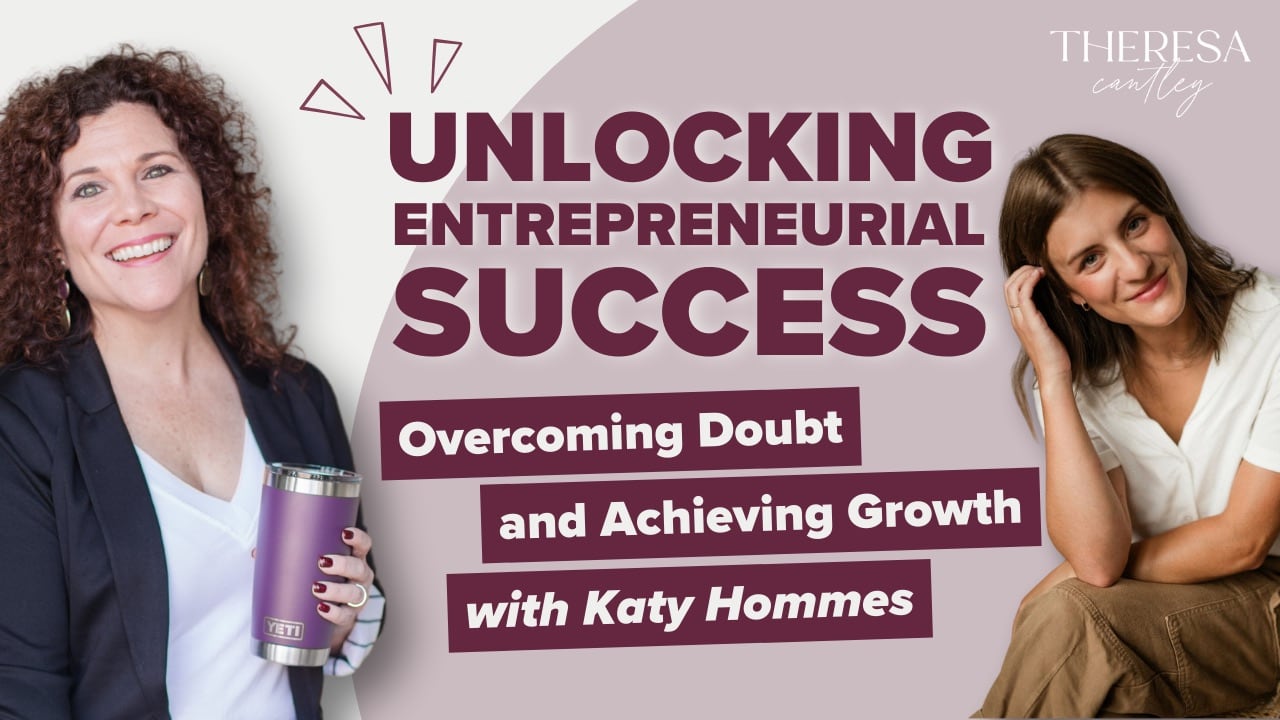If you’ve ever found yourself thinking “Who am I to be doing this?” – you’re not alone. In this episode, I sit down with my right-hand woman, friend, and former coaching client Katy Hommes for a real talk about entrepreneur imposter syndrome, self-doubt, and staying grounded during big transitions.
Meet Katy Hommes
Katy isn’t just part of my team – she’s a designer, creative entrepreneur, and the founder of Rin, a brand that started as a sustainable boutique and is now evolving into a slow fashion label featuring Katy’s own designs. As she gears up to launch her first collection, she shares what it’s like to take on something new – and all the imposter syndrome that can come with it.
“It’s a crazy time to be launching a collection,” Katy says, “but having Theresa as a sounding board through the ups and downs makes a huge difference.”
I get it, because I’ve been there, too. I talk a lot about helping others move past imposter syndrome, but even after years of coaching business owners and building my own brand, I still find myself facing doubt occasionally. This has been especially true when stepping into new things like writing a book or preparing to speak on stage.
But fear doesn’t mean you’re doing something wrong. It usually means you’re on the edge of growth.
How to Deal with Entrepreneur Imposter Syndrome
Instead of running from fear, I’ve learned to get curious about it. Ask your fear questions, like “What is this teaching me? Why is it coming up now?”
Doubt is a signal that something important is happening – a moment that requires reflection, patience, and support.
How Entrepreneur Imposter Syndrome Can Develop
If you look at accounting and legal industries, where employees are often evaluated solely based on billable hours, you can see how entrepreneur imposter syndrome can develop. In workplaces like these, people fight to grab the most work – not because they’re passionate, but because their livelihood depends on it. That kind of scarcity mindset sends a dangerous message: “You only matter if you make money.”
This kind of culture breeds fear, burnout, and entrepreneur imposter syndrome. When your value is tied exclusively to output or income, you start to wonder if you’re truly capable, or just lucky. Your self-worth begins to mirror your latest launch numbers or client count – and that’s a slippery slope.
Redefining Worth: Learning from Microsoft’s Culture Shift
On the other hand, when Microsoft got a new CEO, he decided to create a company full of learners. In other words, curiosity and personal growth were more valuable than perfection or performance.
This shift created space for people to bring their unique perspectives to the table. When curiosity leads, innovation follows. And when leaders encourage exploration over exploitation, people stop feeling like imposters – and start showing up as their whole selves.
That’s a lesson every entrepreneur can take to heart: your value lies in who you are, not just what you produce.
The Way Out: Vision, Not Just Reaction
So how do you stay grounded when the world around you feels uncertain? It all starts with vision.
Too many entrepreneurs base their future on their current reality. But the truth is, your circumstances will always change. A strong vision, on the other hand, is your anchor. It gives you direction even when the path isn’t obvious. And it reminds you that growth is possible – even if today feels hard.
And honestly? If your vision doesn’t scare the crap out of you, you’re not stretching far enough.
When you create from vision instead of fear, you shift your energy. You stop chasing results to prove your worth and start building something meaningful – on your terms.
Comparison is a Business Killer
Saying ‘I should be further along’ is really saying ‘I should be on someone else’s path.’ But your business wasn’t meant to look like anyone else’s. And following someone else’s strategy just because it seems successful can quickly backfire and lead to entrepreneur imposter syndrome.
For example, I recently saw a restaurant business that saw a competitor offering a prix fixe menu and a discounted happy hour and decided to copy it. But what they don’t realize is that the competitor might have a broken cost structure – or their strategy might not even be working.
Instead of reacting to other businesses and succumbing to entrepreneur imposter syndrome, ask a more helpful question: What makes me different? From there, tweak what you see out in the world and make it your own. For example, maybe that restaurant could create a dessert and cocktail menu because they know their customers would love that.
Your Path, Your Pace
At the end of the day, your business is an extension of you – your values, your vision, and the change you want to make in the world. So before you second-guess your pricing, your process, or your product, ask yourself if you’re trying to replicate someone else’s path – or stay true to your own.
Because the real magic doesn’t come from copying what’s trending. It comes from the courage to be different, and the clarity to know why.
Resources Mentioned
💻 Join me every Friday at 10 am on LinkedIn for my free workshop
☕️ Schedule a Virtual Coffee with Theresa
📝 Uncover Your Biggest Blindspots with the Entrepreneur Quiz
H3: Related Episodes
The Truth About Leading Yourself: What Bad Leadership Looks Like (and 4 Ways to Fix It)
Know Thyself: How to Own Your Identity to Be a Better Leader


